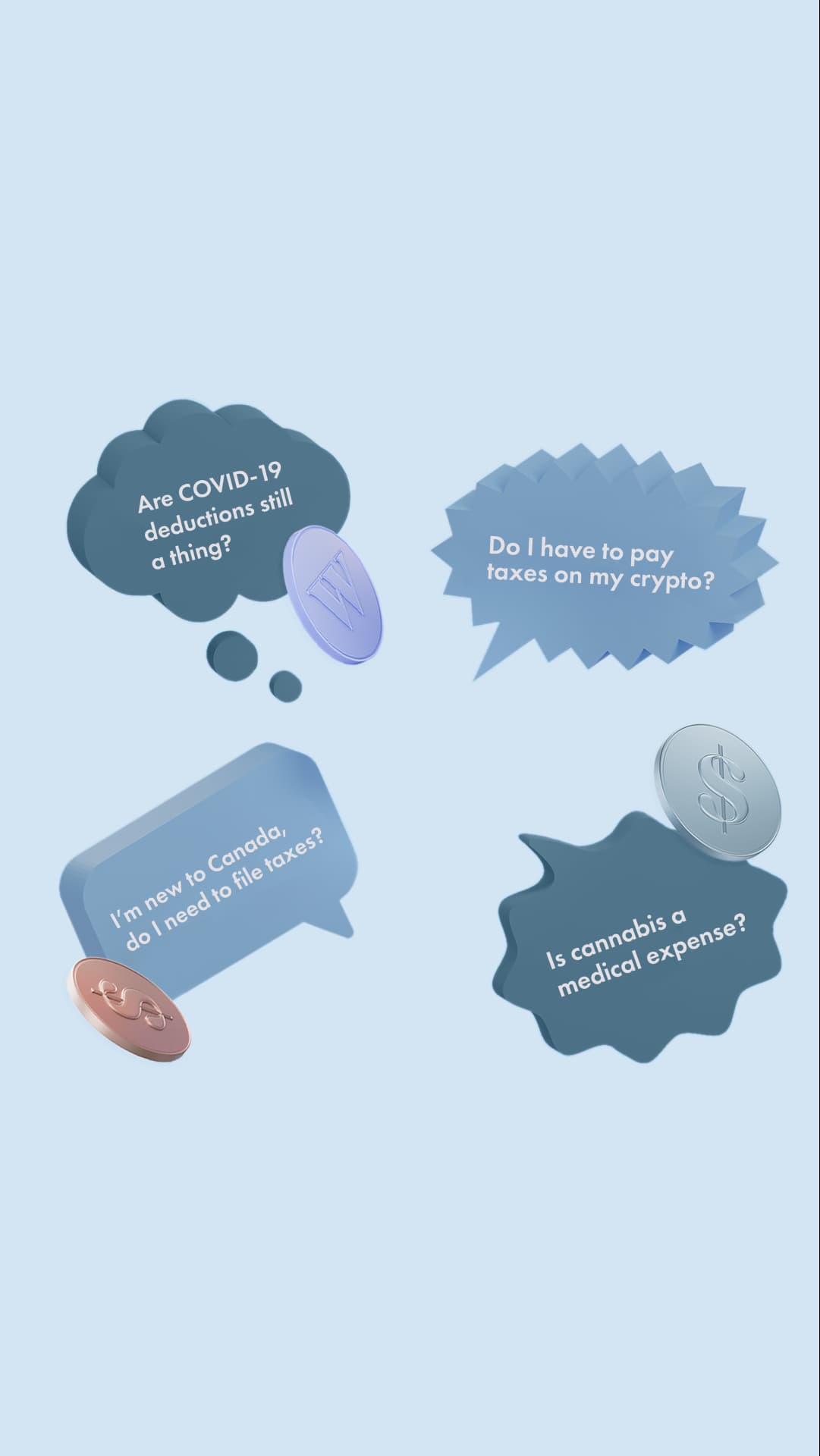
Finance for Humans
The Perfect Guide to Every Little Tax Question You Have
Or at least the 13 most common, thorny questions. We assembled our Wealthsimple Tax team to answer everything you were afraid to look up on the internet — and we promise the answers are easy to understand.
Wealthsimple makes powerful financial tools to help you grow and manage your money. Learn more
It’s time for the best part of the year: taxes! Ok, maybe it’s just a part of the year, but it’s one you don’t want to miss. Here are some of the top tax questions on people’s minds.
1. Are COVID-19 deductions still a thing? I’m still working from home and would love to claim those expenses.
While there have been some changes over the years since the pandemic first hit, claiming home office expenses for remote work still exists. The temporary flat rate method isn’t a thing anymore for your 2023 tax return, but if you’re still working remotely you can follow the detailed method.
It can be a bit of an involved task, but the detailed method lets you claim eligible expenses like internet, utilities, and even rent or maintenance fees you run into in your home, since it now also counts as your office. First, you’ll need to complete form T777 or T777S. If you’ve claimed work from home expenses before, you’ll notice this is different from the T2200 or T2200S forms required in previous years. Then, you’ll need receipts and supporting documents. Before filing, it’s worth looking at the CRA’s comprehensive list of allowable expenses, which includes things like rent, cell phone bills, and internet service plans. Unfortunately you still can’t write off office equipment, mortgage interest, or your daily 5 p.m. negroni.
2. Where is the provincial tuition credit I used to receive each year as a student? I don’t see it calculated.
Beginning in 2016, several provinces, including Ontario, Saskatchewan and Alberta, started eliminating their provincial tuition credit, meaning that depending on where you live, there may not be one calculated for you for this year. (This also means that, sadly, there are no provincial tuition credits available for transfer to a parent or spouse). The federal tuition tax credit is still available, which allows students enrolled in post-secondary education to claim their tuition in order to reduce their taxable income. They can also transfer up to $5,000 of their tuition credit to a spouse, parent or grandparent.

Sign up for our weekly non-boring newsletter about money, markets, and more.
By providing your email, you are consenting to receive communications from Wealthsimple Media Inc. Visit our Privacy Policy for more info, or contact us at privacy@wealthsimple.com or 80 Spadina Ave., Toronto, ON.
3. I heard about something called the digital news subscription tax credit. How do I get it?
In 2019, to promote journalism in Canada, the government introduced this mouthful of a tax credit to benefits. It goes to Canadian digital journalistic organizations that create original written news, and to their subscribers. Any Canadian taxpayer who subscribes to a so-called “qualified Canadian journalism organization” (QCJO) can receive a 15% tax credit of up to $500 dollars in subscriptions for the years 2020-2024. (For the math disinclined, that’s a maximum annual credit of $75.) If you’re not sure whether a subscription qualifies, check your receipt — qualifying news agencies must provide their QCJO designation number in every subscription receipt.
4. What’s the Canada training credit? And am I eligible?
The Canada training credit (CTC), introduced in 2019, provides support for Canadians to learn new job skills. In order to qualify, workers must have been between the ages of 26 and 65 at the end of 2020, and meet certain criteria. If you qualify, you’ll accumulate $250 a year of tax credits every year, up to a maximum of $5,000. (You don’t have to keep track of this balance yourself; the info will be in your Notice of Assessment and your CRA My Account. You can claim up to half the cost of the courses for a given year or your accumulated CTC limit on your Notice of Assessment, whichever is less.
5. I started driving for Skip The Dishes/Uber/Lyft. How do I report my income and expenses?
For starters, may we recommend that you don’t try to do anything tax-related while your car is moving? The type of income earned from your side hustle, whatever it may be, is considered self-employment income, so you just put the amount of your income in the “Business Income” section of your return. Form T2125, aka the Statement of Business Activities form, which every driver will be required to fill out, will not only have boxes for your income, but also itemized deductions for relevant operating expenses, such as mileage and fuel. For further guidance, you may want to make a short pit stop between fares at our detailed T2125 guide.
6. Since cannabis is legal, can I claim it as a medical expense on my tax return?
Getting paid by the government to smoke weed? A dorm-room fantasy of ten years ago is now a reality — if the cannabis is medically prescribed. While cannabis is legal, in order to claim it as a medical expense, a few criteria have to be met, as set out by the CRA. You must have a medical document as defined in the Cannabis Regulations, be registered as a client or holder of a licence for sale, and make your cannabis purchases from that licence holder.
Recommended for you
7. I keep trying to get through to the CRA. What is the best time to contact them?
So, you’re not the type that enjoys hearing “your call is important to us” about 300 times? Us neither. Luckily, the CRA now has a nice feature in which they not only provide specific toll-free numbers for your particular query, they also provide estimated wait times to speak to a representative.
8. I’m going to switch to a different tax software this year. What information do I need from last year’s return?
Very little, we promise. It’s easier than booking a plane ticket (and a whole lot less expensive). For the vast majority of Canadians, switching tends to be super easy. The hardest part of the sign-up process is just filling in your personal information, like name and address and SIN. Those who already have a CRA My Account will find that the auto-fill feature will populate most boxes you need, including your RRSP information.
9. What sort of information is available in CRA My Account?
Want to know the detailed status of your tax return, how much room you have in your TFSA, or who’s going to win the Stanley Cup? The CRA My Account offers two of three of those things. Here’s a full list of available information and documents you can find.
10. Do I need a CRA My Account to file my return?
Not necessarily, but if you like saving time, having a CRA My Account often lets you skip a bunch of the boring stuff through an auto-fill feature. If you prefer to import your own tax slips, then by all means, don’t make an account.
11. I’m convinced. How do I sign up for CRA My Account?
Congrats on this milestone, you tax filer, you! To sign up, whether you’re new to the country or you’ve lived here your whole life, you will first have to file your return and wait for the CRA to assess it. Once you receive the Notice of Assessment, you can sign up for a CRA My Account through their website.
12. I moved to Canada last year. What do I do about money I earned before I moved, will it affect my return?
It may affect your tax credits, meaning it could affect how much tax you owe. Typically you’ll need to enter the income earned prior to moving to the country. You’re not taxed on that income, but that amount will be used to determine if you’re eligible for full Canadian tax credits for the year, or if your tax credits need to be prorated based on when in the year you became a resident. (See the CRA’s overview for newcomers for more information.)
13. I sold a rental property this year. Do I need to report that in my tax return?
Congratulations! Hope you made a bundle. Yes, indeed, you will need to report the transaction on your tax return. There are a few steps to consider:
If you previously claimed depreciation/capital cost allowance (CCA) on this rental property, you’ll need to enter the amount of the sale in the CCA tab found in Rental Income. You may have Recaptured CCA, which will increase your rental income for the year.
You will need to report the sale to determine if there is a Capital Gain or a Capital Loss. Use the Capital Gains (or Losses) section to enter the details of the rental property sale.
Type will be “Real estate, depreciable property.”
Proceeds of disposition: This is the selling price of the property minus any expenses incurred to sell it (legal fees, etc).
Cost of buying the property.
Outlays: Any other eligible expenses you incurred selling the property that haven’t been claimed anywhere else.
Andrew Goldman has been writing for over 20 years and investing for the past 10 years. He currently hosts ["The Originals"](https://podcasts.apple.com/us/podcast/the-originals/id1439490906 ""The Originals"") podcast and writes about personal finance and investing for Wealthsimple. Andrew's past work has been published in The New York Times Magazine, Bloomberg Businessweek, New York Magazine and Wired. He and his wife Robin live in Westport, Connecticut with their two boys and a Bedlington terrier.









